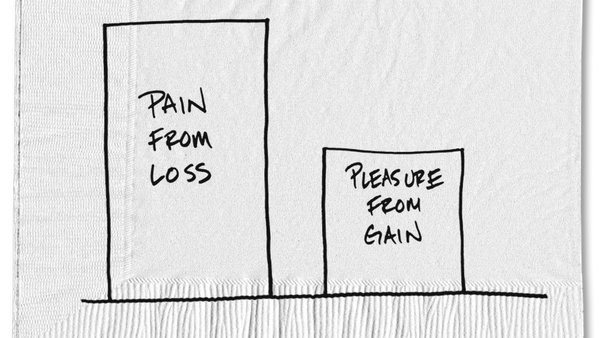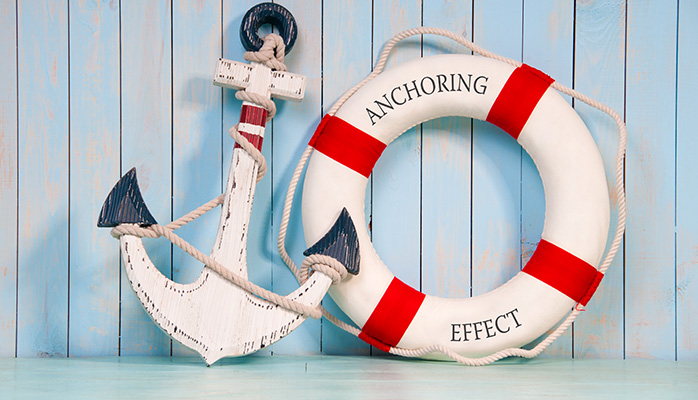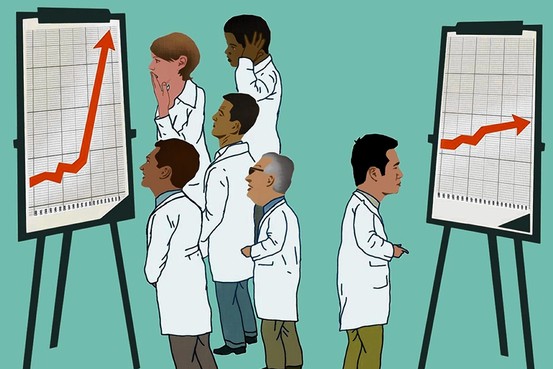5 cognitive biases prevent you from making the right decision
I like to think of myself as a rational person but I'm not that person. And what's interesting here is not only me, you too. We are all rational people.
For a long time, researchers and economists believe that people always make logical decisions and are carefully considered. However, in the last few centuries, some researchers have revealed a series of psychological mistakes that make us deviate from the "rails" of thinking. Sometimes, we make the right decisions but there are many times when we are confused, emotionally dominated and unreasonable when choosing.
Psychologists and behavioral researchers are interested in finding biases on this perception. There are a lot of mistakes and they are also given many interesting names such as " mere exposure effect " or " narrative fallacy". However, what I want to discuss here is not scientific jargon but psychological mistakes that occur regularly in our lives and explain them to you using easy words. understand the best.
Here are 5 psychological biases that make it impossible for you to make the right decision.
1. Survivorship Bias (Prejudice survived)
Nearly all popular electronic newspapers now have many articles that are "infected" with prejudice. It's not hard to find series like "8 things that successful people do every day" , "The best advice Richard Branson ever received" or "What do rich people do when they have a lot of money" . ., you are witnessing "prejudice of survival" in action.

Surviving prejudices refer to the tendency of people to focus on winners in a particular field and try to learn from them while completely ignoring the losers who have also used a strategy act like that.
There are thousands of athletes practicing in LeBron James's way but very few people have achieved great achievements in the NBA seasons. The problem here is that no one has noticed that thousands of others have never climbed to the top of glory. We only hear about people who are "surviving". We have made the mistake of overestimating tactics, strategies and advice from "survivors" while ignoring the fact that they are only suitable for a few people.
Another example: "Richard Branson, Bill Gates and Mark Zuckerberg, all dropped out of school and became billionaires! You don't need school to succeed. Entrepreneurs just need to stop wasting time in classrooms. and start your career early ".
Richard Branson succeeded despite having chosen that path and not successful because he chose it. Except for Branson, Gates and Zuckerberg, there are thousands of other startups who have failed, the bank debt is piling up and abolishing what they're doing. Surviving prejudices are not simply saying that a strategy may not be suitable for you, but it also emphasizes that we do not really understand whether the strategy is always effective.
When only thinking of the victors but forgetting that there are still many people failing, it's hard to say that a certain strategy will surely lead to success.
2. Loss Aversion (Fear of loss)
Loss Aversion reflects our tendency not to face failure and desire to avoid all failures more than longing for something. Research shows that if someone gives you 10 USD, you will have some satisfaction, but if you lose 10 USD, your satisfaction will drop very quickly and the feeling is much worse. These two types of reactions are contradictory and are not balanced in size.

The tendency to avoid failure makes us make stupid decisions and change our behavior simply to keep things in our possession. We are attached to the sense of protection of what is there and this makes each person overestimate them in comparison with choices.
For example, if you buy a new pair of shoes, it will make you a little satisfied. However, even if you haven't been wearing those shoes, throwing it away a few months later makes you extremely miserable. You have never used them but for some reason, you can not stand the scene away from what belongs to you. Or another example like you own an item and don't use it but you're not willing to let friends or someone else need it. This is the "fear of loss".
3. Availability Heuristic (Experience available)
Availability Heuristic can be interpreted as "available experience" or "feeling of availability". However, this is not important. The problem here is that this "psychological error" implies a common mistake made by our brains: considering things that appear in mind easily are also the most important or most common things. . In other words, we tend to judge what is more likely to happen based on memorable, vivid and impressive memories.

For example, one might argue that smoking is not unhealthy based on the fact that his grandfather lived up to 100 years old and smoked 3 packs a day, an argument that ignored his ability. His internal is an exception.
In addition, a study conducted by Steven Pinker at Harvard University shows that we now live in the least violent period of history. Many people are living in more peace than before. The rate of murderers, sexual assault, rape and child abuse generally tends to decrease.
Most people feel shocked when hearing these statistics. Some people don't want to believe them. If there is a most peaceful time in history, why is there so much war going on so far? Why do we hear about rape, murder, crime every day? Why do people talk so much about acts of destruction and terror?
Welcome to the world of people who believe in "available experience"!
The answer is that we are not only living in the most peaceful period of history but also living in a time when information became the most explosive in history. News about disasters or crimes is now so prevalent. Just a quick search on the Internet that you have received a wealth of information about the most recent terrorist attacks than any paper newspaper can transmit 100 years ago.
Percentage of dangerous events in general tends to decrease but considering each type of danger alone, many of them tend to increase. And because these events will easily enter our minds, the brain will assume that they occur at a greater frequency than they actually are.
We overestimate the impact of things that we can remember and underestimate the popularity of events that we have never heard before.
4. Anchoring Effect (Effect of an anchor)
Anchoring - the "sticking" mentality to something that is also known as the "anchor" effect.

There was an association when thinking about the town where I was born. It is known as the place of people selling wine and cheese. On the menu, they highlight the words: "limit 6 cheeses on each piece of burger".
My first thought was: "This is very ridiculous. Who gives 6 cheeses to a burger?"
My second thought was: "What kind of cheeses will I be given?" (curious).
I didn't realize these restaurant owners were very smart until I learned about the "anchor" effect. You see, normally, I just put one cheese in the cake but when I read the words "limit 6 cheeses" on the menu, my mind will be stuck to the number 6.
Most of us don't call 6 cheeses but the appearance of this "anchor" has made us move from 1 piece to 2 pieces, even 6 pieces of cheese and add some meat in each piece.
This effect is applied in many studies and business environments. For example, salespeople realize that if you say "limit 3 / customer" then, users will find a way to buy twice in comparison with saying "unlimited quantity".
In one study, volunteers were asked to predict the percentage of African countries participating in the United Nations. However, before guessing, they will spin a wheel with the numbers posted on it 10 or 65. When the volunteers turn right into box 65, the average forecast is about 45%. When we turn to cell 10, we expect about 25%. The essence of this study is only the result of sticking to predictions with a higher or lower number than the given number (the highest estimates come from those who have hit the numbers. High on wheels).
The effect of the anchor appears the most when it comes to price. If the price recorded on a new watch is $ 500, you might consider it too expensive compared to the amount you can afford. However, if you take a walk in the store and first, you look at a watch that costs $ 5,000 in front of the counter when suddenly the $ 500 figure seems to be an acceptable price. Many high-end products that the showrooms have never been expected to sell in large numbers. However, they play an important role in creating "anchors" in customer thinking and stimulating you decide to buy valuable products that you think are "much cheaper" than them.
5. Confirmation Bias (Thien Kien confirmation)
Confirmation Bias refers to the trend of finding information to confirm existing thoughts and beliefs based on bias perception, while ignoring and underestimating the information that makes them I doubt my inherent belief.

For example, A believes that climate change is a serious problem. After that, A only seeks and reads stories related to environmental protection, climate change or alternative energy. As a result, A continues to confirm and reinforce what he believes.
Meanwhile, B does not believe that climate change is a serious problem. Then, B only searched and read stories that discussed that climate change is still a mystery, why scientists make mistakes and how people are being cheated. As a result, B continues to confirm and reinforce what he believes.
Changing thinking is extremely difficult. The more you believe that you know something, the more you filter and ignore the contrary information. This is like when you think you're always lucky to wear a red shirt. The reason is because, you just remember the times when this is true and skip the other lucky times when you're not wearing a red shirt.
You can expand this way of thinking to almost all topics. If you buy a Honda Accord and you believe it is the best car on the market, naturally, you'll just read articles that praise it as a great supercar. Meanwhile, another magazine listed a car selected as the best car of the year, you simply ignored it and thought it was wrong or thought what they were looking for. that's different from what you're expecting in a car.
The search for evidence, explain and remember favorably is considered to be the cause of overconfidence in personal beliefs, polarizing or fanatic views.
Forming a hypothesis and then testing it in different ways to prove it is wrong is very strange behavior for many people. Instead, we are more likely to make a hypothesis, then, assume it is correct and only look for information to protect our prejudices. Most people don't want new information, they want to confirm the information they already know.
So what is the lesson here?
Once you understand these common psychological biases, your first reaction may be: "I want to end these prejudices! I don't want them to affect my decision making! Can I stop my brain from creating that bias? "
This is a great question but not simple to answer. Rather than thinking of these mistakes as a signal that your brain is having "problems" it is better to consider them as evidence of the "shortcuts" your brain is using. Use is not useful in all cases. However, there are many aspects in everyday life that show that these biases are also beneficial. Certainly, when you know how to make use of it, you won't want to remove it anymore.
The problem here is that the brain is so excellent at performing these functions well - it is possible to create these biases very quickly and easily, so we sometimes make unwanted mistakes.
In such cases, self-awareness is often one of the best choices. Therefore, practice this skill so as not to be prejudiced by your prejudices.
You should read it
- ★ 9 psychological tricks to help you become 'interesting and interesting communication'
- ★ 10 things you need to remember when you are in the decision to choose
- ★ Try these 13 psychological tricks to easily communicate with people
- ★ Making Informed Decisions Key Tips Before You Borrow for Your HDB Flat
- ★ Understanding these 5 psychological issues, your life will become happier!